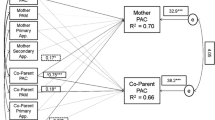Abstract
It is known that many mothers rapidly share the results of their BRCA1/2 genetic testing with their children, especially adolescent children. What is less known is the extent to which these mothers may engage fathers in a discussion concerning genetic counseling and the anticipated disclosure of genetic test results to children, or seek shared decision making in this context. This short communication addresses this issue by first examining mothers’ and fathers’ discussions concerning a research study of family communication. In our view, this conversation likely served as a precursor to, and proxy indicator of, maternal receptivity to partner input regarding the genetic counseling/testing-results disclosure process. We further evaluated how the quality of the parenting relationship is associated with mothers’ decisions to include or not include the child’s father in this study. Finally, this report addresses potential ways in which the genetic counselor may be able to facilitate parental communication regarding the evolving process of disclosure of genetic information to children and adolescents.

Similar content being viewed by others
References
Abidin, R. R., & Brunner, J. F. (1995). Development of a parenting alliance inventory. Journal of Clinical Child Psychology, 24, 31–40.
Abidin, R. R., & Konold, T. R. (1999). Parenting Alliance Measure professional manual. Odessa, FL, USA: Psychological Assessment Resources.
Bearss, K. E., & Eyberg, S. (1998). A test of the parenting alliance theory. Early Education and Development, 9, 179–185.
Bower, M. A., McCarthy Veach, P., & Bartels, D. M. (2002). A survey of genetic counselors’ strategies for addressing ethical and professional challenges in practice. Journal of Genetic Counseling, 11, 163–186.
DeMarco, T. A., & McKinnon, W. C. (2007). Life after BRCA1/2 testing: Family communication and support issues. Breast Disease, 27, 127–136.
DeMarco, T. A., Tercyak, K., & Peshkin, B. (2005, November). Risk communication and the family: Assessing parental attitudes about coummunicating BRCA1/2 test results to children. Presented at the 24th annual meeting of the National Society of Genetic Counselors Los Angeles, CA.
Forest, K., Simpson, S. A., Wilson, B. J., et al. (2003). To tell or not to tell: barriers and facilitators in family communication about genetic risk. Clinical Genetics, 64, 317–326.
Hallowell, N., Ardern-Jones, A., Eeles, R., Foster, C., Lucassen, A., Moynihan, C., et al. (2005a). Communication about genetic testing in families of male BRCA1/2 carriers and non-carriers: patterns, priorities and problems. Clinical Genetics, 67, 492–502.
Hallowell, N., Ardern-Jones, A., Eeles, R., Foster, C., Lucassen, A., Moynihan, C., et al. (2005b). Men’s decision-making about predictive BRCA1/2 testing: the role of family. Journal of Genetic Counseling, 14, 207–217.
Konold, T. R., & Abidin, R. R. (2001). Parenting alliance: a multifactor perspective. Assessment, 8, 47–65.
Manne, S., Audrain, J., Schwartz, M., Main, D., Finch, C., & Lerman, C. (2004). Associations between relationship support and psychological reactions of participants and partners to BRCA1 and BRCA2 testing in a clinic-based sample. Annals of Behavioral Medicine, 28, 211–225.
Peterson, S. K., Watts, B. G., & Koehly, L. M. (2003). How families communicate about HNPCC testing: findings from a qualitative study. American Journal of Medical Genetics, 119c, 78–86.
Schneider, K. A., Chittenden, A. B., Branda, K. J., Keenan, M. A., Joffe, S., Patenaude, A. F., et al. (2006). Ethical issues in cancer genetics: I 1) whose information is it. Journal of Genetic Counseling, 15, 491–503.
Segal, J., Esplen, M. J., Toner, B., Baedorf, S., Narod, S., & Butler, K. (2004). An investigation of the disclosure process and support needs of BRCA1 and BRCA2 carriers. American Journal of Medical Genetics A, 125, 267–272.
Sobel, S. K., & Cowan, D. B. (2000). Impact of genetic testing for Huntington disease on the family system. American Journal of Medical Genetics, 90, 49–59.
Tercyak, K. P., Hughes, C., Main, D., Snyder, C., Lynch, J. F., Lynch, H. T., et al. (2001a). Parental communication of BRCA1/2 genetic test results to children. Patient Education and Counseling, 42, 213–224.
Tercyak, K. P., Peshkin, B. N., Streisand, R., & Lerman, C. (2001b). Psychological issues among children of hereditary breast cancer gene (BRCA1/2) testing participants. Psychooncology, 10, 336–346.
Tercyak, K. P., Peshkin, B. N., DeMarco, T. A., Brogan, B. M., & Lerman, C. (2002). Parent–child factors and their effect on communicating BRCA1/2 test results to children. Patient Education and Counseling, 47, 145–153.
Tercyak, K. P., Peshkin, B. N., DeMarco, T. A., Patenaude, A. F., Schneider, K. A., Garber, J. E., et al. (2007). Information needs of mothers regarding communicating BRCA1/2 cancer genetic test results to their children. Genetic Testing, 11, 249–255.
Van Oostrom, I., Meijers-Heijboer, H., Duivenvooden, H., et al. (2007). Family system characteristics and psychological adjustment to cancer susceptibility testing: a prospective study. Clinical Genetics, 71, 35–42.
Weissman, S. H., & Cohen, R. R. (1985). The parenting alliance and adolescence. Adolescent Psychiatry, 12, 24–45.
Acknowledgments
This research was supported by a grant from the National Human Genome Research Institute at the National Institutes of Health (HG002686) to Dr. Tercyak; additional support was provided through the Fisher Center for Familial Cancer Research at the Lombardi Comprehensive Cancer Center. The authors would like to thank the individuals who volunteered to participate in this research, as well as the clinical and research staff members involved in the project.
Author information
Authors and Affiliations
Corresponding author
Rights and permissions
About this article
Cite this article
DeMarco, T.A., Peshkin, B.N., Valdimarsdottir, H.B. et al. Role of Parenting Relationship Quality in Communicating about Maternal BRCA1/2 Genetic Test Results with Children. J Genet Counsel 17, 283–287 (2008). https://doi.org/10.1007/s10897-007-9147-7
Received:
Accepted:
Published:
Issue Date:
DOI: https://doi.org/10.1007/s10897-007-9147-7



